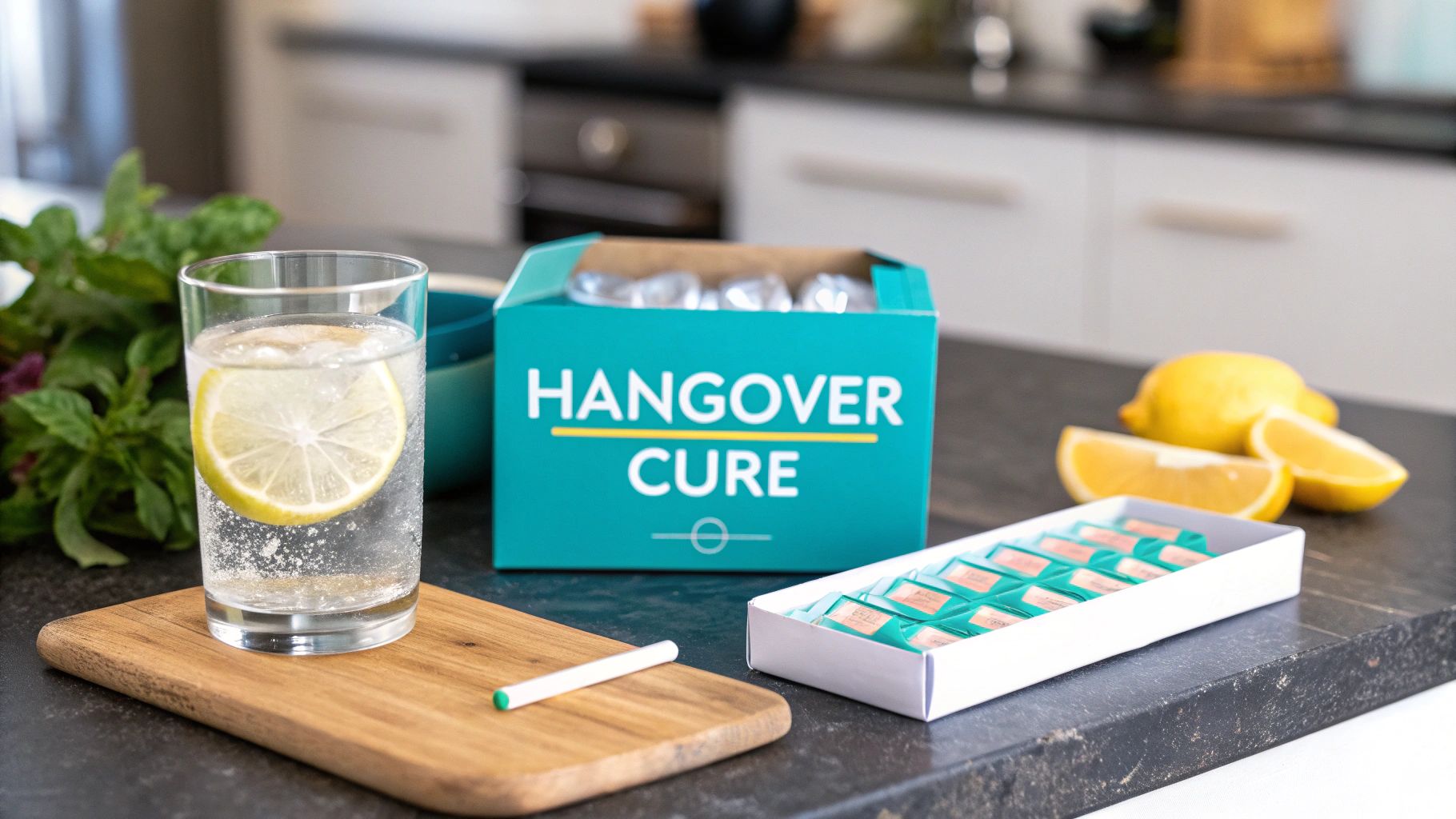

· By Annemarie
How to Cure a Wine Hangover for Good
If you've ever woken up after a few glasses of red wine feeling like you've been hit by a truck, you’re not imagining things. A wine hangover is a special kind of awful, and it’s not just about the alcohol content.
What makes that Cabernet or Merlot so much more punishing than other drinks? It’s all about the unique cocktail of compounds hiding in your glass.
Why That Wine Hangover Feels So Brutal
We’ve all been there. You have a couple of glasses of a beautiful, deep red wine and feel fantastic. The next morning? A pounding headache, nausea, and a general feeling of doom. While all hangovers share some common ground, the wine hangover is in a league of its own, thanks to a few key culprits that make the morning after a nightmare.
It’s about way more than just the ABV percentage on the bottle. Wine, especially the red varieties, is full of naturally occurring chemical compounds. These give it that amazing color, aroma, and complex flavor profile we love, but they're also the source of our misery.
The Science Behind the Suffering
Let's get into the nitty-gritty of what’s actually going on in your body. There are a few main offenders working together to make you feel terrible:
- Congeners: These are chemical byproducts from the fermentation and aging process. They’re what give dark liquors and red wines their character, but they’re also a nightmare for your body to break down. The more congeners, the more severe your hangover is likely to be.
- Histamines: Primarily found in grape skins, histamines can set off allergy-like responses in many people. If you’ve ever felt stuffy, flushed, or developed a headache after drinking wine, histamines are probably to blame.
- Tannins: These are the compounds that give red wine that dry, slightly bitter taste and mouthfeel. For some of us, tannins are a major headache trigger.
This infographic breaks down how these troublemakers team up to ruin your morning.
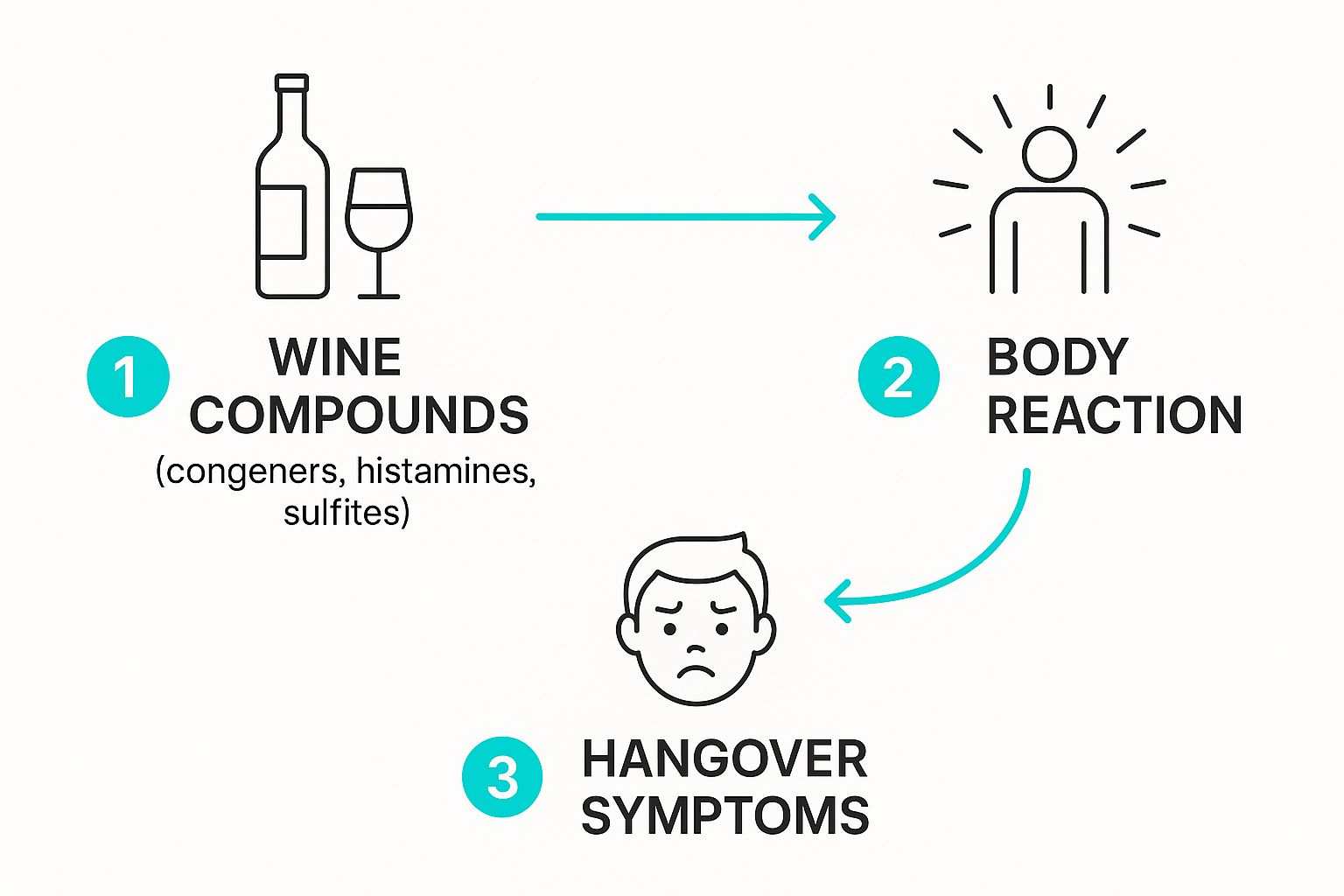
As you can see, it’s this perfect storm of compounds—not just the alcohol itself—that makes a wine hangover so uniquely dreadful. The intensity really comes down to what’s in your specific bottle. If you want to learn more about the basics, we have a whole guide on what causes hangovers.
Bottom line: A dark, full-bodied red is going to have a much higher concentration of congeners, histamines, and tannins than a light, crisp white wine. That’s exactly why that bold Merlot often hits way harder than a Pinot Grigio.
Research actually shows that hangover symptoms are at their absolute worst when your blood alcohol level gets back down to zero. It's a cruel twist of fate—you feel the most miserable hours after you've stopped drinking.
Your Game Plan for a Hangover-Free Night
Let’s be honest, the best way to deal with a wine hangover is to stop it from happening in the first place. A little proactive planning means you can actually enjoy your night without that feeling of dread about the next morning. This isn't just vague advice—it's a real strategy for before, during, and after you drink.
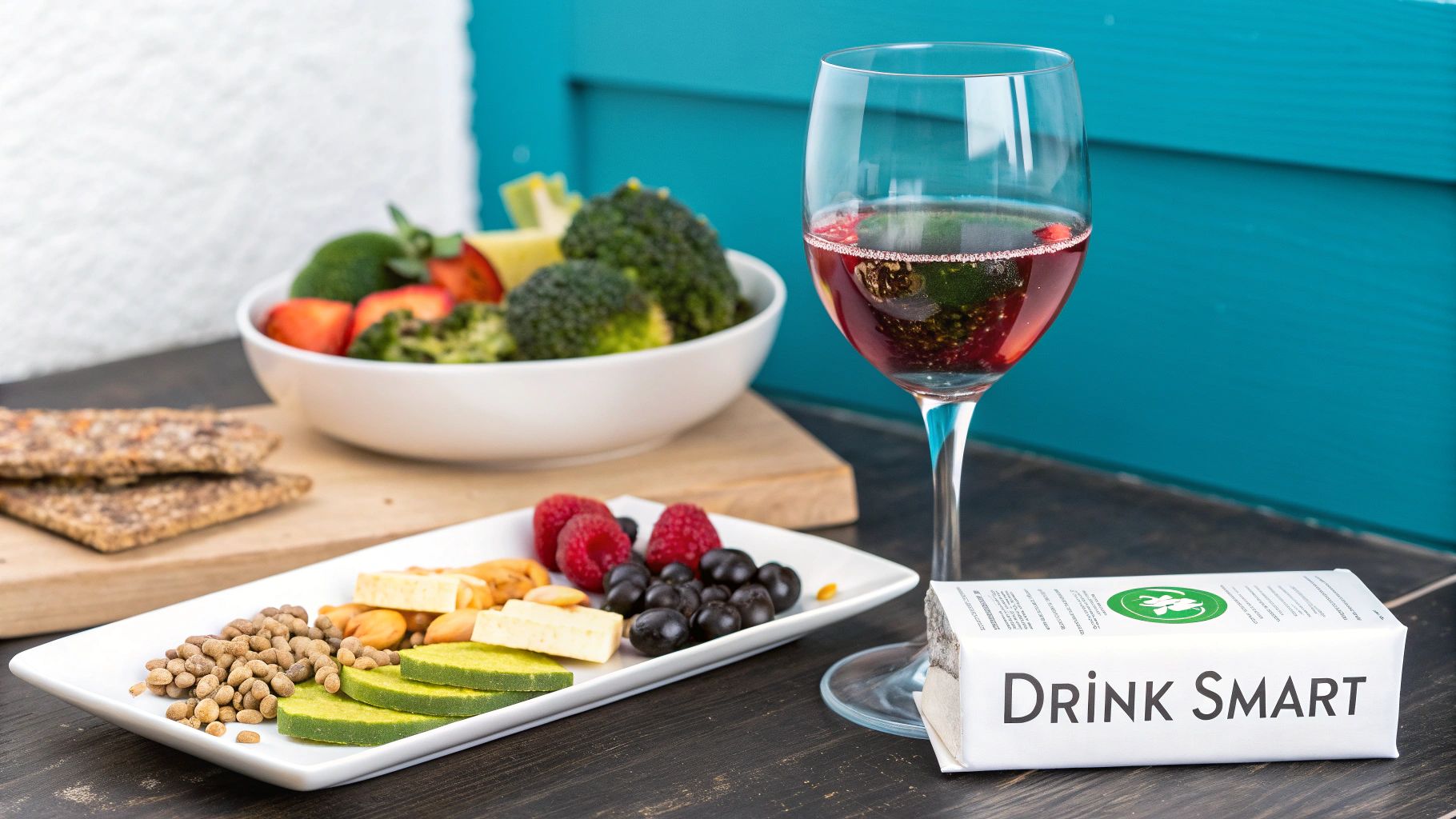
This whole process really kicks off hours before you even pour your first glass. We all know drinking on an empty stomach is a terrible idea; it just lets the alcohol rush straight into your system. Think of it like building a solid foundation.
A good meal slows everything down, giving your liver a fighting chance. Aim for a balanced plate with protein, healthy fats, and some complex carbs.
Smart Strategies Before You Sip
Before you even think about popping that cork, it’s time to get your body ready. This prep work goes beyond just food and can make a massive difference in how you feel when your alarm goes off.
A few key moves can really bolster your body’s defenses against what’s coming.
- Hydrate Early: Start sipping on water well before your event. Alcohol is a diuretic, which means it pushes fluids out of your body. If you start the night already hydrated, you've got a crucial head start.
- Take Your Upside: This is your secret weapon. Taking an Upside Hangover Stick before that first drink is probably the single most effective thing you can do. It front-loads your system with a powerhouse of essential vitamins, antioxidants, and liver-supporting heroes like DHM and Milk Thistle.
Think of Upside as giving your liver a superhero cape before it goes into battle. It provides the exact tools your body needs to process alcohol and its nasty byproducts way more efficiently.
Pacing Yourself Through the Night
Once you're out and about, the strategy shifts to smart sipping. It’s so easy to get swept up in the fun, but a little mindfulness goes a long way. The goal is to have a great time without completely overwhelming your system.
Pacing isn’t just about drinking slowly; it’s about actively managing your intake all evening. My favorite rule is the one-for-one method: for every glass of wine, have a full glass of water. It’s a simple habit that directly fights off dehydration.
It also helps to stick with lighter-colored wines like Sauvignon Blanc or Pinot Grigio when you can. They generally have fewer congeners (the stuff that contributes to nasty hangovers) than darker reds. If you want to dive deeper, check out our complete guide on how to prevent a hangover before drinking. It's packed with even more expert tips to make sure your night is a total success.
Your Morning-After Recovery Playbook
We’ve all been there. Despite the best intentions, you wake up after a night of wine feeling... less than stellar. That throbbing headache and churning stomach are signs you need a solid recovery plan, and fast. This isn't about some miracle cure, but a few smart, deliberate moves to get your body back on track.
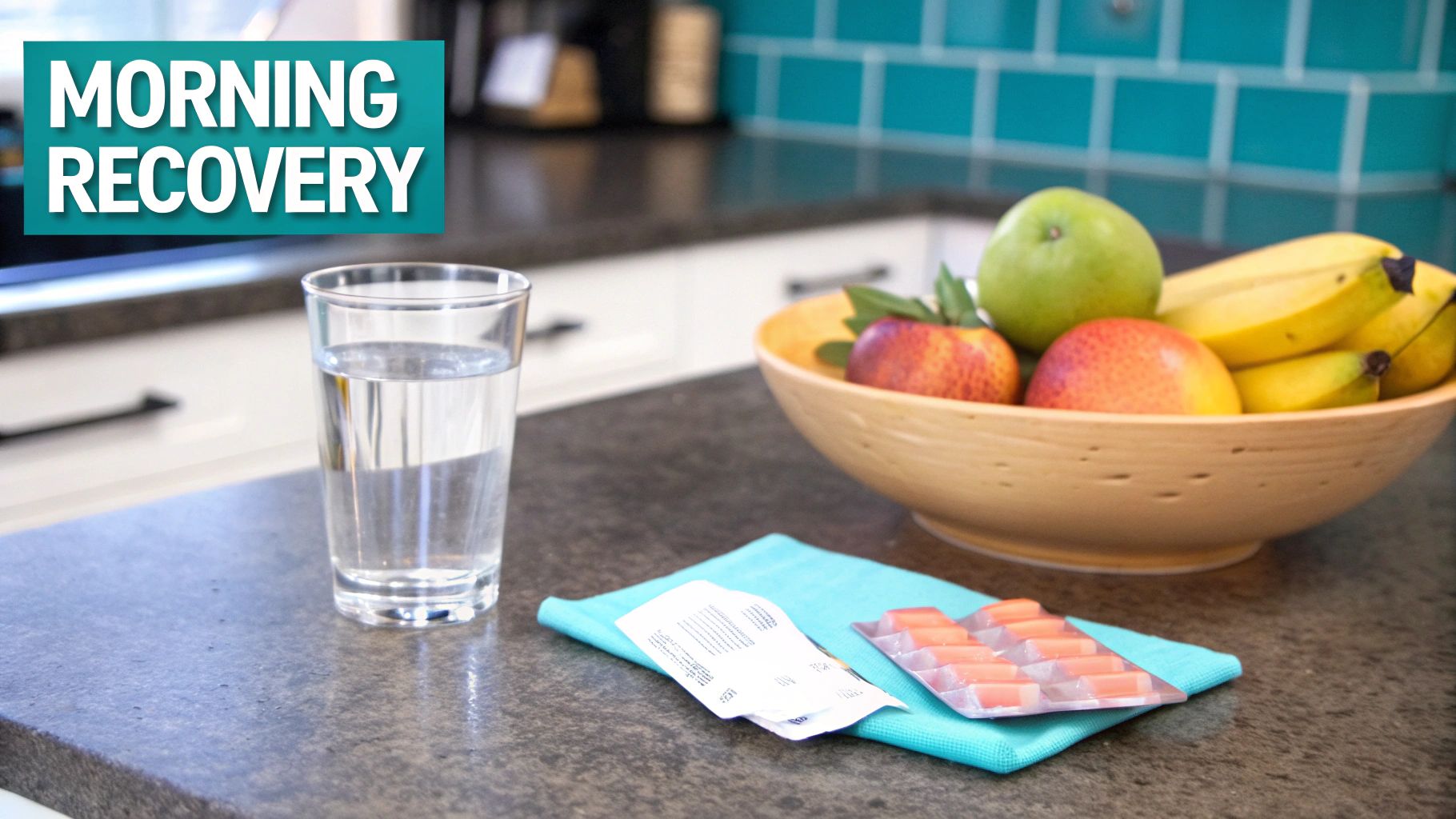
Your first instinct should be water, but let's level that up. A plain glass is fine, but after a few glasses of wine, your body is screaming for more than just H2O. Alcohol is notorious for flushing out essential electrolytes like potassium and sodium—the very things your body needs for fluid balance and nerve function.
This is where an electrolyte-rich drink can feel like a godsend. I'm talking coconut water, a low-sugar sports drink, or even a glass of water with a squeeze of lemon and a tiny pinch of salt. This isn't just about quenching thirst; it’s about rehydrating your body on a cellular level, which is way more effective than chugging plain water.
Here's a quick cheat sheet to get you started as soon as your eyes open.
Morning-After Wine Hangover Recovery Checklist
| Symptom | Immediate Action | Why It Works |
|---|---|---|
| Headache & Dehydration | Drink an electrolyte beverage. | Restores sodium and potassium, helping your body absorb water more effectively. |
| Nausea & Upset Stomach | Eat a light, bland meal like eggs or oatmeal. | Provides essential nutrients (like cysteine in eggs) without overwhelming your digestive system. |
| Fatigue & Brain Fog | Go for a short, slow walk outside. | Boosts circulation and mood-lifting endorphins without causing more dehydration. |
| Overall Weakness | Get back to bed or rest on the couch. | Allows your body to focus its energy on processing toxins and repairing itself. |
This checklist is your first line of defense, but what you put in your body next is just as critical.
Nourish Your Body Intelligently
Food is your friend right now, but you have to choose wisely. A greasy breakfast sandwich might sound tempting, but it’s the last thing your sensitive stomach needs. That will just make your digestive system work overtime.
Instead, think gentle and nutrient-dense. Here are a few of my go-to's for kicking a wine hangover to the curb:
- Eggs: They're full of cysteine, an amino acid that helps your body break down acetaldehyde, that nasty byproduct of alcohol that’s making you feel awful.
- Bananas: One of the best sources of potassium you can find, perfect for replenishing those lost electrolytes.
- Oats: Give you a slow, steady release of energy and are packed with B vitamins, which alcohol depletes.
A simple bowl of oatmeal topped with a sliced banana can seriously work wonders.
Even if you took precautions the night before, you can still give your body a boost the next day. An Upside Hangover Stick in the morning can help top up those vital nutrients and give your liver some extra support as it finishes its cleanup job.
Gentle Movement and Rest
Forget the old myth about "sweating it out." A hard workout will only dehydrate you more. But that doesn't mean you should be completely sedentary.
Some very light activity can actually help. A slow, easy walk in the fresh air can get your blood flowing and do wonders for your mood without putting any extra stress on your system.
But honestly, the most powerful recovery tool you have is simply rest. Your body is in overdrive trying to find its balance again. If you can swing it, give yourself permission to sleep in or just lounge on the couch. That downtime is non-negotiable for letting your body reset and finally shake off that lingering brain fog.
Natural Remedies and Supplements That Actually Work
When you’re staring down the barrel of a wine hangover, popping an aspirin and chugging water only gets you so far. To really get back on your feet, you need to think beyond just masking the symptoms.
Your body is putting in some serious overtime, and the right natural remedies and supplements can give it the backup it needs. It's all about tackling the root causes—like supporting your liver, refueling on lost nutrients, and calming the inflammation that alcohol’s nasty byproducts leave behind.
Think of it as giving your system the exact tools required to clean up the mess efficiently.
The A-Team of Hangover Support
Let's be real, not all supplements are created equal. A lot of products are just marketing hype, but certain ingredients have some serious science behind them when it comes to processing alcohol and softening the blow.
These are the heavy hitters you should be looking for:
- Dihydromyricetin (DHM): This is the VIP of liver support. This plant extract helps your liver metabolize acetaldehyde—that’s the toxic compound making you feel awful—much faster.
- Milk Thistle: An old-school classic for good reason. Milk thistle is packed with an antioxidant called silymarin that helps shield liver cells from damage and keeps its natural detox processes running smoothly.
- Essential Vitamins: A night of drinking basically raids your body's vitamin supply. It especially depletes B-vitamins, which are crucial for energy. A good formula will have B1, B2, B3, and B6 to help you shake off that sluggish, foggy feeling.
This is exactly why a comprehensive formula like our Upside Hangover Sticks works so well. We've combined all these powerhouse ingredients into one easy dose. It creates a team effort that you just don't get from taking one ingredient on its own. For more ideas, you can dive into our full guide on other natural remedies for hangovers.
You want to fight the battle on all fronts: liver support, nutrient replacement, and antioxidant defense. A multi-ingredient supplement is a far more complete answer to a complex problem like a hangover.
The science backs this up. Research on hangover treatments often zeroes in on anything that can speed up alcohol metabolism. For example, in one study, the extract of the plant Oenanthe javanica was shown to significantly lower plasma alcohol concentration in animal tests. You can read more on the science here. It just goes to show how much value there is in using ingredients that have been put to the test.
How to Choose the Right Hangover Product
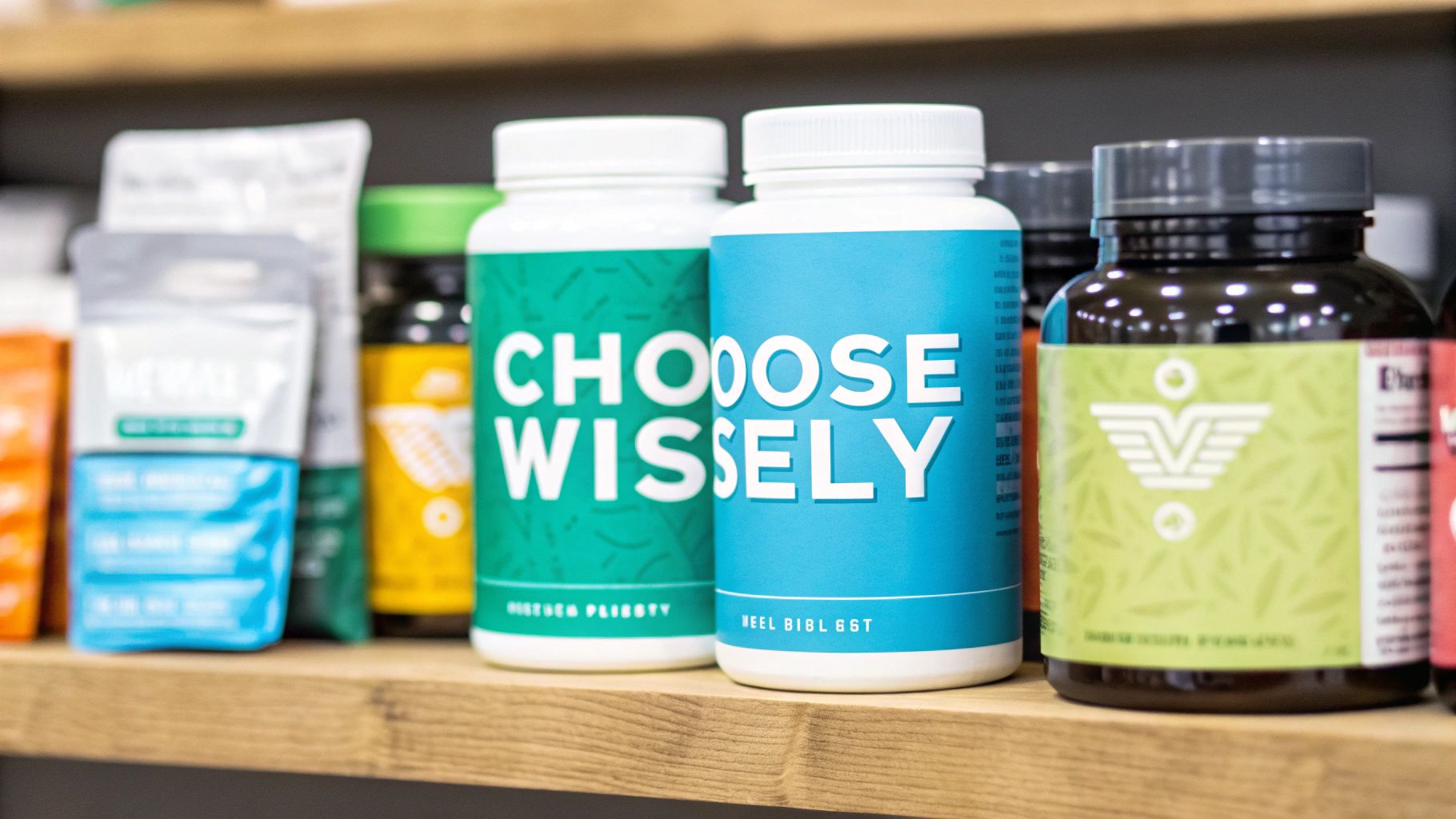
Trying to find a way to dodge a wine hangover can feel like navigating a minefield. The market is absolutely flooded with pills, powders, and patches, all shouting from the rooftops about how they're the "one true cure."
It's a huge business—the global market for these products is valued at around $2.52 billion in 2024, which tells you one thing: a lot of people are looking for a reliable fix. You can read more about the growth of the hangover cure market to see just how massive this industry has become.
But how do you cut through all that noise? It really just comes down to looking past the flashy marketing and figuring out what actually works for your life.
Comparing Your Options
Let's be real, not all hangover remedies are created equal. The format itself plays a massive role in whether it's actually effective and convenient when you need it most.
- Pills and Capsules: The old-school classic. But they can be slow to absorb, and honestly, trying to swallow a handful of pills when you're already feeling queasy is a big ask.
- Powdered Mixes: These can be great, but they always require water and a bit of a production to mix them up. It makes them less discrete and kind of a hassle when you're out and about.
- Jelly Sticks: This is the modern format that Upside Hangover Sticks uses, and it’s a total game-changer. They come pre-portioned, you can take them anywhere, and the jelly form means your body can absorb all those key ingredients much faster.
When you're trying to decide, just think about the real-world situation. Are you more likely to meticulously mix a powder in a crowded bar, or just discreetly enjoy a tasty jelly stick before you even have your first drink?
At the end of the day, the best product is the one you’ll actually remember—and want—to use. Convenience is just as important as the ingredients inside the box. When you find something that's both scientifically formulated and incredibly easy to use, you’re not just buying a product; you’re investing in a much, much better morning.
Got Questions About Wine Hangovers? We’ve Got Answers.
Even with the best intentions, you’re bound to have some questions when you’re trying to sidestep a brutal wine hangover. Let’s cut through the noise and bust a few common myths so you can feel good about your game plan.
Does the "Hair of the Dog" Actually Work?
We’ve all heard it, but let’s be real. While another drink might seem like a good idea in the moment, it absolutely does not cure a hangover. It just delays the inevitable misery.
This old trick just kicks the can down the road, making you even more dehydrated and forcing your liver to work overtime. A much smarter move is to focus on rehydrating and giving your body the nutrients it’s crying out for.
Are Pricier Wines Less Likely to Cause Hangovers?
Not really. While it’s true some cheaper wines might be loaded with extra sugar or additives, the real culprits behind your headache are usually the alcohol content itself and compounds like congeners and histamines.
Trust me, an expensive, high-congener Bordeaux can leave you feeling way worse than a simple, budget-friendly Pinot Grigio.
It's less about the price and more about the wine's profile. Dark, high-tannin reds are often the biggest offenders, so pay attention to how your body reacts to different types.
Can I Still Use Something Like Upside After I’ve Already Started Drinking?
Yes, you definitely can. The best-case scenario is taking a preventative supplement like Upside Hangover Sticks before your first glass to get your body ready.
But taking it mid-session or even after your last drink is still a huge help. It gets to work immediately, helping your body process the alcohol and replenish all those good nutrients you’re losing. It can make a massive difference in how you feel the next morning.
Ready to enjoy your wine without dreading the aftermath? Keep Upside on hand and you can forget about the morning-after regrets.
See how Upside Hangover Sticks can change your night out!
#upside #enjoyupside #upsidejelly #livemore #hangovercure #hangoverprevention #fighthangovers #preventhangovers #HangoverRelief #MorningAfter #PartySmarter #HydrationStation #WellnessVibes #RecoverFaster #NoMoreHangovers #HealthyParty #HangoverHacks #FeelGoodMorning #NightlifeEssentials #HangoverFree #SupplementGoals #PostPartyPrep #GoodVibesOnly #HealthAndParty #HangoverHelper #UpsideToPartying
